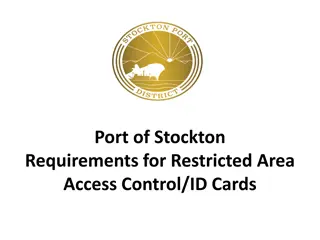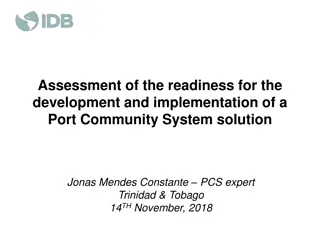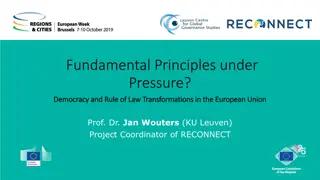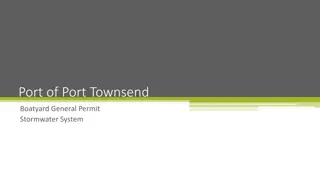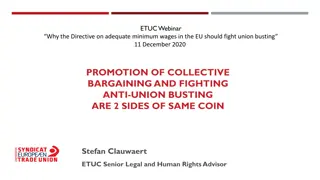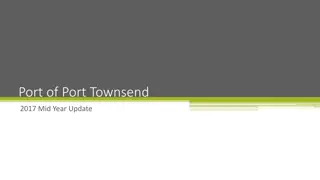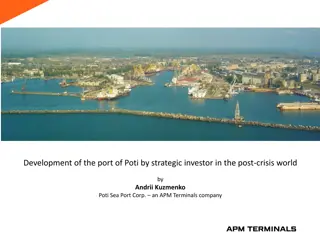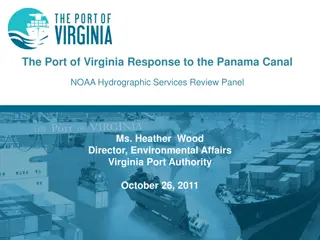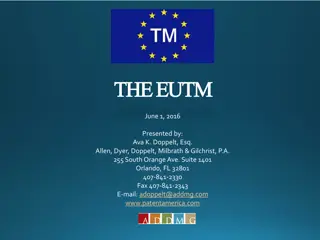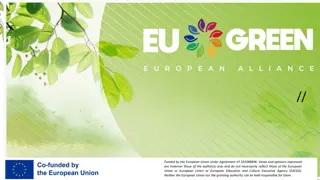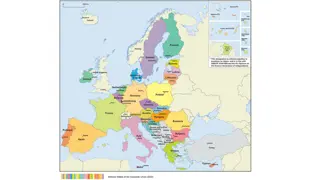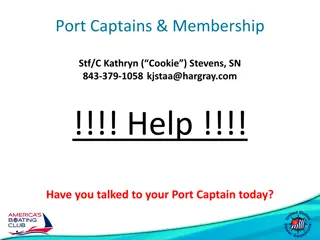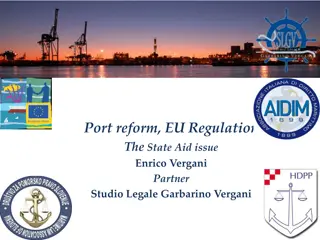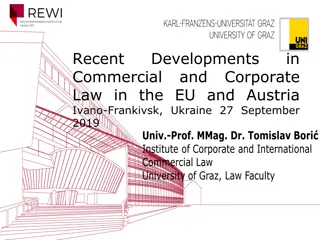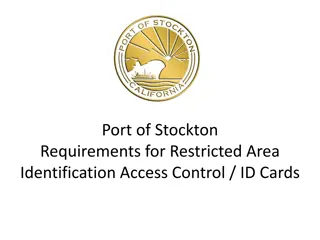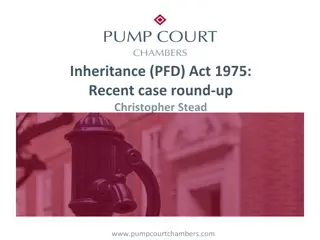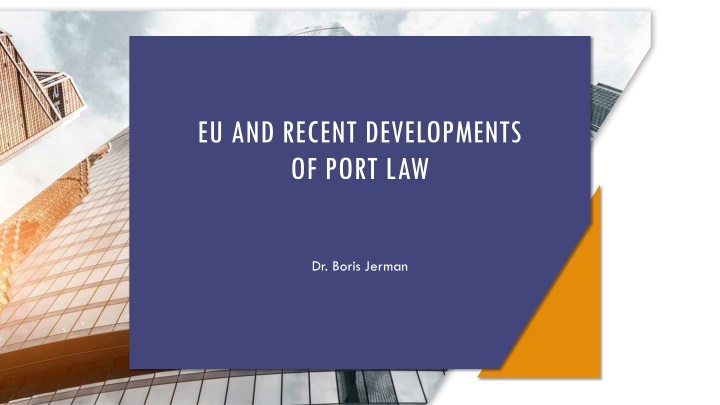
Recent Developments of Port Law in the European Union
European ports play a crucial role in the global trade network, with a significant portion of trade passing through their facilities. The legal regulation of port activities within the EU has seen advancements with the adoption of the Port Service Regulation in 2017. Despite the complexity of port operations, regulations at both national and EU levels are continuously evolving, covering areas such as concession and public procurement law, competition law, labor law, environmental law, and cybersecurity law.
Download Presentation

Please find below an Image/Link to download the presentation.
The content on the website is provided AS IS for your information and personal use only. It may not be sold, licensed, or shared on other websites without obtaining consent from the author. If you encounter any issues during the download, it is possible that the publisher has removed the file from their server.
You are allowed to download the files provided on this website for personal or commercial use, subject to the condition that they are used lawfully. All files are the property of their respective owners.
The content on the website is provided AS IS for your information and personal use only. It may not be sold, licensed, or shared on other websites without obtaining consent from the author.
E N D
Presentation Transcript
EU AND RECENT DEVELOPMENTS OF PORT LAW Dr. Boris Jerman
European ports are Gateways to the world. About 75% of Europes trade with the rest of the world and more than one third of intra-European trade is shipped through its seaport. Ports cannot be considered strictly from a transport perspective but more broadly as a supply chains, this means they are clusters in the area of transport, energy, industry, blue economy etc. Ports represent multidisciplinary activity that goes beyond economic aspects and expands into wider levels of social life. 2
Such activity, given its complexity, requires legal regulation. It is impossible to expect such a complex activity to be covered by a single piece of legislation. Notwithstanding the above, the legal regulation of port activity at the level of the European Union is characterized by being among the les regulated among various areas of legal regulation. After more than fifteen years of efforts and negotiations, it was in 2017 adopted Port Service Regulation (Regulation EU 2017/352). Although it was expected that port sector by it would be more comprehensively regulated, this is not the case, because in many ways it represents a compromise. 3
The compromise is also reflected in the fact that Member States may decide, that Port Service Regulation provisions on access to port infrastructure in relation to cargo handling, passenger services and pilotage will not apply. Notwithstanding Port Service Regulation, is an important document governing access to port infrastructure and financial transparency (the latter is mainly a matter of separate accounting, when an individual entity carries out an activity both in its own and in the public interest). 4
One of the reasons why no comprehensive regulation has been established in the European Union to regulate ports in uniform way is diversity of ports system, however this does not mean that legislation governing ports is not evolving at both national and European Union level. Port law is evolving in various areas. Some areas are discussed below, which are often debated at EU level: - Concession and public procurement law, - Competition law, - Labour law, - Environmental law, - Cybersecurity law. 5
Concession and public procurement law: Access to the market for port services is limited, because ports represent limited space and not everyone who would like to provide port services, can do so. As a result concessions emerged in the performing of port services. In should be mentioned in this regard Directive 2014/23/EU (on the award of concession contracts), Directive 2014/24/EU (on public procurement) and Directive 2014/25/EU (on procurement by entities operating in water, energy, transport and postal service sectors). EU Regulation 2017/352 is not the basis for concession and public procurement law, and also explicitly states that its provisions do not preclude the above mentioned legislation, however, its provisions help to set minimum requirements for performing of services that providers shall meet in concession award procedures. 6
Competition law: EU competition law is broader than U.S. antitrust law. The EU rules cover not only rules on that cover anti-competitive arrangements (cartels), abuse of dominance, merger control, but also state aids provided by EU Member states. Anti-Competitive Arrangements: Under Article 101 od TFEU an arrangement between undertakings which has the object of effect of preventing, restricting, or distorting competition in the EU is generally prohibited and void. There was little private litigation or government enforcement under Article 101 relating to ports. Ports and their trading partners should avoid exchange competitively sensitive information or to engage in any form of price-fixing or anti-competitive collaboration. 7
Abuse of dominance: Article 102 of the TFEU prohibits all abuses of dominance without the possibility of exemption or exceptions. a) Access to ports: The EU Commission follows form the view that ports represent essentialfacilities thereby mandating access to prospective users even where the allegedly dominant port is small in size (Irish Continental Group v. CCI de Morlaix). a) Operating Conditions at Ports: The port service provider in the port, which also has an influence on the management of the port, cannot prescribe such conditions for other operators, which would give it visibly better conditions to other operators (Commission Decision IV/34.174 Sealink/B&I Holyhead). 8
Merger control: It refers to purchases, sales, concluding joint ventures in the port sector. These transactions must comply with the provisions of the rules relating to merger control. This is one of the most sensitive areas of competition law. Individual entities enter the market of port services through the above mentioned transaction. A very interesting phenomenon lately is Chines interest, supported by public authorities and resources, taking control of terminals and port companies in Europe, as part of the geopolitical project of the New Silk Roads. The EU Commission, legislator and other competent bodies are still looking for solutions. 9
State aid: State aid is an important part of the port sector development, as it involves very large investments in the port infrastructure, which are not profitable, but necessary for its development. Article 107(1) of the TFEU contains the general prohibition of state aid. There are some exemptions in Article 107(2), however these exemptions are of little importance for the port sector: - aid having social character, granted to individual consumers, provided that such aid is granted without discrimination, - aid to make good the damage caused by natural disasters or exceptional occurrences, 10
- aid granted to the economy of certain areas of the Federal Republic of Germany affected by the division of Germany. More important is the provision of Article 107 (3) that addresses cases such as: - aid to promote the execution of an important project of common European interest or to remedy a serious disturbance in the economy of a Member states, - aid to facilitate the development of certain economic activities or of certain economic areas, where such aid does not adversely affect trading conditions to an extent contrary to the common interest. 11
There are three ways in which states aid could be approved: - aid notified to, and approved individualy by, the Commission, - aid that is covered by an aid scheme pre-approved by the Commision, - by virtue of a block exemption regulation. Block exemption regulation Block exemption regulation is an important area of state aid for ports. It is based on the fact that legislation already defines which projects can be financed through state aid and therefore they do not need to be presented to European Commision. It automatically approves them if they are allowed by legislation. 12
Block exemption regulation was adopted for ports by the Regulation (EU) 2017/1084. According to article 56b of Regulation (EU) 2017/1084 state aid for maritime ports shall be compatible with the internal market within meaning of Article 107(3) of the TFEU and shall be exempted from the notification requirement of Article 108(3) of the TFEU if it relates to eligible costs, including planning costs, regarding investments: - for the construction, replacement or upgrade of port infrastructures, - for the construction, replacement or upgrade of access infrastructure, - dredging. State aid is not allowed to non-transport related activities, including industrial production facilities active in a port, offices or shops and as well for port infrastructure. 13
Labour law: Labour law in ports is one of the laws, where there is no legal regulation at EU level. In this respect Regulation (EU) 2017/352 explicitely defines that it does not affect the application of Member States social and labour legislation. The only exemption is Article 14, which requires port service providers that employees must receive the training necessary to acquire knowledge essential to their work, with special emphasis on health and safety aspects. The main characteristics of the development of labour law in the Member States is the loosening of monopolies of port workers associations and introduction of port work on a commercial basis, which means as well the employment of port workers directly with port service providers: - in Italy it was crucial the sentence of European Court of Justice Merci convenzionali Porto di Genova S.p.a. v Siderurgica Gabrieli S.p.a. After this sentece followed the Law no. 84/94, 14
- in Spain this process began with the Law no. 48/03, - in the 1990s, a collective agreement was concluded for port workers in France at national level, based on general labour legislation, while port service operators were allowed to employ workers directly. The Netherlands has gone the furthest with the liberalization of port work, where port workers pools have been abolished. 15
Environmental law: One of the last challenges facing the European Union in the field of environmental protection is the so called EU Green Deal . The essence of the said deal is a rapid energy and green transition. The first stage in this field is to decrease emissions by 50% compared with 1990 levels by 2030 and the final zero emissions by 2050. In this respect the European Commission adopted Communication (COM/2019/640 final) entitled The European Green deal . 16
Green deal for ports means: - the production and supply of low-emission energy in port facilities, - facilitating modal excanges and door-to-door transport goods, whereas ports are one of the important links in the logistics chain, - testing digital solutions and intelligent systems, - providing new tools for the optimization of traffic within ports, - develop regulatory and market conditions to implement sustainable solutions, - set up new models of collaboration between port agents to facilitate and use of sustainable energy, - the development of master plans for cleaner ports. 17
In order to achieve the GreenDeal binding legislation is being prepared at EU level, which will allow apply to ports. Among the documents recently adopted in the area of environmental protection and relating directly to ports, it is necessary to mention Directive (EU) 2019/883 of the European Parliament and of the Council on port reception for the delivery of waste from ships. Under this directive Member states shall ensure the availability of port facilities adequate to meet the need of the vessel using the port without causing undue delay to ships. 18
Cybersecurity law: In order to be efficient, ports need to introduce more and more new technologies into their processes. One of the very current technological processes currently underway is digitization. Digitization contains not only a technological challenge but also a threat to cyber attacks. This is all the more important for ports, as they represent critical infrastructure. To prevent cyber threats, the European parliament and council has adopted Directive (EU) 2016/1148 concerning measures for a high common level security of network and information systems across the Union. 19
Under this Directive Member States are obliged to lay down measures to achieving common level of security of network and information system within the Union so as to improve the functioning of the internal market. One of the measures to achieve this goal is that by 9 November 2018, for each sector and subsector referred to in Annex II, Member States should have identified the operators of essential services with an establishment on their territory. Among these services are as well operators of port Services; in Slovenia Luka Koper, d.d. is defined as a operator of essential services in port sector and on this basis, it is committed to taking appropriate action against cyber threats. 20
As cyber threats pose an increasing threat, perpetrators are becoming more and more effective, the adoption of a new directive NIS 2 is being prepared. 21


